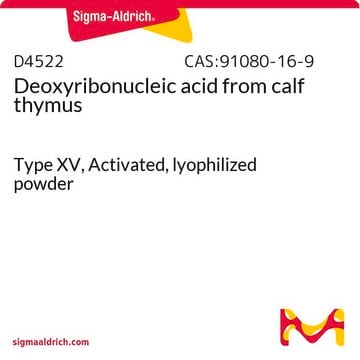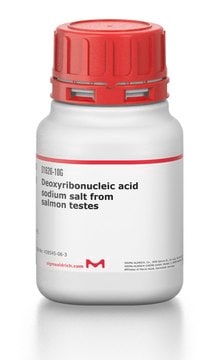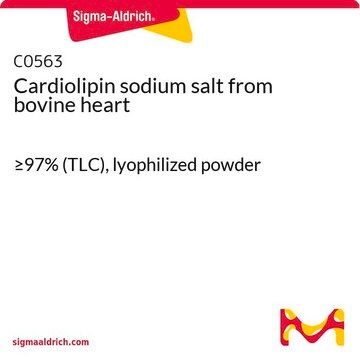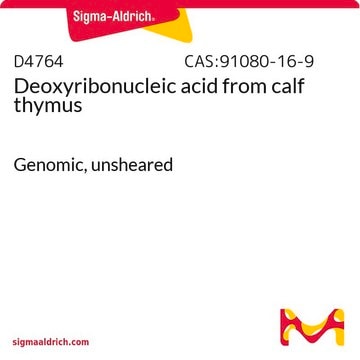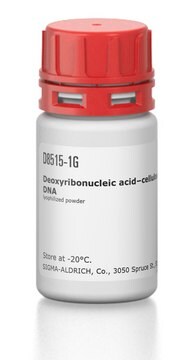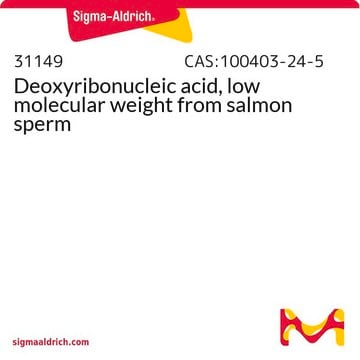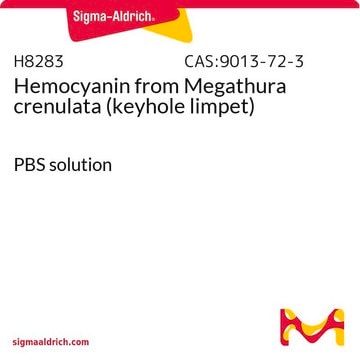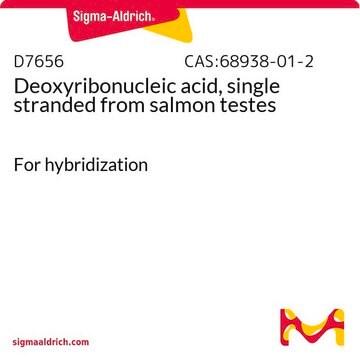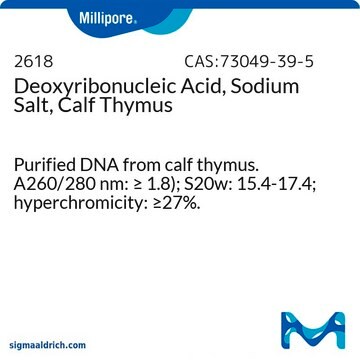D8899
Deoxyribonucleic acid, single stranded from calf thymus
lyophilized powder
Synonym(s):
DNA single stranded
Sign Into View Organizational & Contract Pricing
All Photos(1)
About This Item
CAS Number:
EC Number:
MDL number:
UNSPSC Code:
41106310
eCl@ss:
32160414
NACRES:
NA.52
Recommended Products
grade
for molecular biology
Quality Level
form
lyophilized powder
mol wt
~50 kb
composition
ssDNA, ≥65%
storage temp.
−20°C
Looking for similar products? Visit Product Comparison Guide
General description
High quality single-stranded template DNA isolated from the thymus of male and female calves.
Application
Calf thymus DNA is exceptionally useful as a substrate for DNA polymerase assays, in the amplification of very long fragments and as a carrier DNA for precipitations. It was used as a standard for DNA quantification by fluorescent assay and in DNA-binding assay.
Calf thymus DNA is exceptionally useful as a substrate for DNA polymerase assays, in the amplification of very long fragments and as a carrier DNA for precipitations.
Features and Benefits
• Activated
• No nuclease activity detected after 16 h at 37 °C incubation
• High quality template DNA
• No nuclease activity detected after 16 h at 37 °C incubation
• High quality template DNA
Quantity
One mg DNA is approx. 25 A260 units.
Preparation Note
Prepared by a modification of the method of Alberts and Herrick from calf thymus DNA.
Reconstitution
Dissolve the DNA gently rocking overnight to a final concentration of 1mg/ml in molecular biology grade water.
Storage Class Code
10 - Combustible liquids
WGK
WGK 3
Flash Point(F)
Not applicable
Flash Point(C)
Not applicable
Personal Protective Equipment
dust mask type N95 (US), Eyeshields, Gloves
Choose from one of the most recent versions:
Certificates of Analysis (COA)
Lot/Batch Number
Don't see the Right Version?
If you require a particular version, you can look up a specific certificate by the Lot or Batch number.
Already Own This Product?
Find documentation for the products that you have recently purchased in the Document Library.
Customers Also Viewed
J A Hansen et al.
Journal of animal science, 75(7), 1810-1821 (1997-07-01)
We evaluated the effects of recombinant porcine somatotropin (pST) and the beta-adrenergic agonist salbutamol on plasam endocrine and metabolite profiles and muscle chemistry in three genotypes of growing barrows (n = 96, 139 d old). Treatments were in a 2
H Kamei
Cell biology international, 20(11), 769-775 (1996-11-01)
The anti-desmin monoclonal antibodies (MAbs) DSB389, AC54, and DSB860 recognize intermediate filaments (IFs) and nuclear antigens that appear granular, locate around chromosomes, and are insoluble following 0.5% Triton X-100 and cetyltrimethylammonium bromide (CTAB) extraction. Nuclear antigens of the MAbs were
José Luis García-Giménez et al.
Journal of inorganic biochemistry, 121, 167-178 (2013-02-07)
Ternary copper(II) complexes [Cu(NST)2(phen)] (1) and [Cu(NST)2(NH3)2]·H2O (2) [HNST=N-(4,5-dimethylthiazol-2-yl)naphthalene-1-sulfonamide] were prepared and characterized by physico-chemical techniques. Both 1 and 2 were structurally characterized by X-ray crystallography. The crystal structures show the presence of a distorted square planar CuN4 geometry in
Qiong Guo et al.
Spectrochimica acta. Part A, Molecular and biomolecular spectroscopy, 106, 155-162 (2013-02-05)
A divanadium(V) complex, [V2O3(o-van-val)2] (o-van-val=Schiff base derived from o-vanillin and L-valine), has been synthesized and structurally characterized. The crystal structure shows that both of the vanadium centers in the complex have a distorted octahedral coordination environment composed of tridentate Schiff
Eswaran Ramachandran et al.
Inorganic chemistry, 52(3), 1504-1514 (2013-01-18)
A series of four new palladium(II) complexes of 2-oxo-1,2-dihydroquinoline-3-carbaldehyde thiosemicarbazones with triphenylphosphine as coligand have been synthesized and characterized by the aid of various spectral techniques. The single-crystal X-ray diffraction studies revealed that the unsubstituted thiosemicarbazone ligand acted as monobasic
Our team of scientists has experience in all areas of research including Life Science, Material Science, Chemical Synthesis, Chromatography, Analytical and many others.
Contact Technical Service